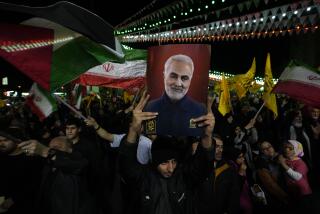U.S. Attack Is Near, Hussein Tells Aides : Military: He warns war council of an allied assault in a âfew daysâ and talks of preparing for âurban warfare.â
AMMAN, Jordan â Iraqi President Saddam Hussein told his military command Tuesday that U.S. and allied forces intend to attack âin the coming few days.â
Convening a war council of senior military and government officials for the second time in 24 hours, Hussein said he expects a combined assault on occupied Kuwait, which Iraqi troops invaded almost three months ago.
Hussein personally directed talks on âpreparations for urban warfare and necessary measures to be taken in the event of combat in the operation zone of the Kuwait province,â the official Iraqi News Agency reported.
Tuesdayâs meeting came on the heels of a failed weekend initiative by the Soviet Union to budge Iraq from the annexed oil sheikdom and subsequent American warnings that the option of war remains open.
âWe must be prepared with all that God has given us of potential to thwart perfidious intentions by the United States and its allies to launch an attack in the coming few days,â the news agency quoted Hussein as telling the Baghdad council.
Attending were Iraqâs top military command and the ministers of defense, military industries and information. The news agency report also said that top officers of the Iraqi army stationed in Kuwait joined the talks. It did not say whether the military governor there--Ali Hassan Majid, a Hussein cousin and commander of the brutal 1988 suppression of Iraqi Kurds--was in attendance.
Nor did the agency report disclose any specific cause for Husseinâs alarm. Announcement of Tuesdayâs meeting--there had been no notice given of the meeting reportedly held on Monday--could have been designed to portray Washington as warlike in Baghdadâs continuing propaganda campaign to divide international opposition to its invasion of Kuwait.
And Iraqi officials often speak of imminent attack. âWe expect America to attack at any moment,â Information Director Naji Hadithi is given to remarking almost nonchalantly to Western reporters working in Baghdad.
Nevertheless, the Persian Gulf crisis, which enters its fourth month on Friday, appeared to tighten over the past three days in a confluence of pressures: the virtual collapse of the Soviet diplomatic initiative and none to replace it; a new U.N. Security Council resolution pinpointing Iraqi repression in Kuwait, and reports from recently freed hostages of gross abuse of Western captives by Iraq.
President Bush and Secretary of State James A. Baker III turned up the heat Monday in separate remarks warning Hussein that Iraq would be held responsible for its actions.
Bush declared that he has authority to move in the gulf, without congressional approval if necessary. And Baker raked the Baghdad regime over reported maltreatment of the more than 100 Americans held hostage at strategic sites in Iraq. He repeated the American position that Washington âwill not rule out a possible use of force if Iraq continues to occupy Kuwait.â
The American leaders expressed support for diplomatic efforts to force Iraq to abandon Kuwait, and Bush said that the United States is not preparing for war. But there appeared to be little movement in the Middle East on Tuesday after the high-profile Soviet effort fizzled in weekend talks in Baghdad between Hussein and Yevgeny Primakov, Soviet President Mikhail S. Gorbachevâs envoy.
Hussein refused to heed the series of U.N. resolutions demanding withdrawal of his forces from Kuwait, and Gorbachev, in Paris, could only suggest that âthe best thing would be to have an inter-Arab meeting, some Arab mechanism.â He suggested that the lead come from Saudi Arabia, where American-led Western forces and Arab allies face dug-in Iraqi troops across the Kuwaiti frontier.
But Arab diplomats contacted in Amman on Tuesday held little hope for success. âWho has the authority?â asked one, speaking anonymously. âThe divisions (in the Arab world) are quite deep.â
The Soviet effort is continuing, but it clearly lost steam in the face of a defiant Hussein. Moscow had won a 48-hour delay in voting on the latest Security Council resolution over the weekend as Primakov, meeting the Iraqi leader for the second time this month, pressed for some sign of a political solution.
Primakov was in Saudi Arabia on Tuesday for talks with King Fahd, and he also met with Kuwaitâs ousted rulers, who told him that they appreciated his efforts to resolve the standoff but would accept nothing less than an unconditional Iraqi withdrawal from their country.
Hussein, in an interview with Cable News Network on Monday, had called his talks with Primakov âdeep and very usefulâ but clung to his public position that Iraq will not withdraw from Kuwait and that Middle East issues should be raised in an international conference. âIf God were to will that war occur, then we, believers in God, will not object,â he added.
The latest Security Council resolution against Iraq, passed 13 to 0 Monday with abstentions from Yemen and Cuba, specifically condemned the taking of hostages by Iraq. More than 2,000 Westerners and Japanese are being held in Iraq and Kuwait against their will, having been denied exit permits, and several hundred are being held as virtual prisoners at strategic sites.
The State Department puts the number of Americans held as human shields at the sites--oil fields, ammunition factories, dams and other possible bombing targets--at 104.
More to Read
Sign up for Essential California
The most important California stories and recommendations in your inbox every morning.
You may occasionally receive promotional content from the Los Angeles Times.










